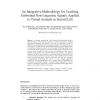494 search results - page 15 / 99 » Evaluating a Reinforcement Learning Algorithm with a General... |
ATAL
2007
Springer
14 years 1 months ago
2007
Springer
Reinforcement learning is a popular and successful framework for many agent-related problems because only limited environmental feedback is necessary for learning. While many algo...
GECCO
2011
Springer
12 years 11 months ago
2011
Springer
The reward functions that drive reinforcement learning systems are generally derived directly from the descriptions of the problems that the systems are being used to solve. In so...
GECCO
2005
Springer
14 years 1 months ago
2005
Springer
In neuroevolution, a genetic algorithm is used to evolve a neural network to perform a particular task. The standard approach is to evolve a population over a number of generation...
AGI
2008
13 years 9 months ago
2008
A teaching methodology called Imitative-Reinforcement-Corrective (IRC) learning is described, and proposed as a general approach for teaching embodied non-linguistic AGI systems. I...
ICML
2000
IEEE
14 years 8 months ago
2000
IEEE
Eligibility traces have been shown to speed reinforcement learning, to make it more robust to hidden states, and to provide a link between Monte Carlo and temporal-difference meth...

